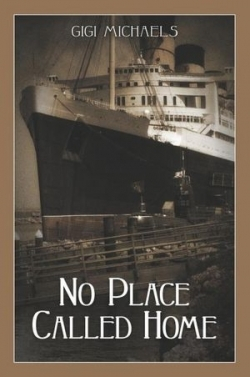No Place Called Home
In No Place Called Home, Gigi Michaels introduces readers to her family’s Holocaust survival story. Her fictionalized account follows two loving, close-knit families who become united through the marriage of a son and daughter.
In the early 1930s, as Hitler becomes chancellor of Germany, the Hess family, including son Ernst, is living a comfortable, working-class life in the Jewish ghetto in Eisenstadt, Austria. Even as Hitler’s troops press onward, Ernst’s family stays put, believing that “There is no anti-Semitism here!” Reality strikes when Ernst’s brother is picked up while walking home from work and taken to the Dachau concentration camp.
Meanwhile, in Vienna, the Kornmehl family enjoys a more elegant lifestyle, delighting in the social and cultural life of the city. Daughter Margaret, like Ernst Hess, dreams of attending university. Instead, she enters a disastrous marriage, which is followed by divorce and a year attending culinary school in London. Even as Hitler incorporates Austria into Nazi Germany, and the younger Kornmehls face harassment and threats from the SS, their parents are loath to accept the inevitable. Kristallnacht in 1938 convinces them otherwise.
The fears and pressures created by the need to flee Nazi rule resonate within both families. Emigration from Austria is difficult and dangerous; the fact that borders are closed to Jews throughout the world make the challenge even greater. Both the Hess and Kornmehl families must abandon all that they know for the mere chance of staying alive and together.
Perhaps the most intriguing aspect of Michaels’s story is the families’ journeys to Shanghai, the only port still open to European Jews. Familiar with neither the language nor the culture, the families live uncomfortably in the poorer section of the city.
Eventually, Ernst and Margaret wed, and the war ends. Michaels continues the combined families’ tale with their journey from Shanghai to Palestine, and back to Austria, then on to Canada and the United States.
No Place Called Home is an amazing account of unqualified love, extreme endurance, strong family ties, and hope. A simply, yet convincingly, written story with straight-forward prose, this book is suitable for adolescent or adult readers. More memoir than fiction, Michaels’s story speaks of truth and desperation in difficult times and survival against extraordinary odds. She brings readers to tears and leaves them wanting to know more about the strong, incredibly resilient Hess and Kornmehl families.
There is one minor flaw in this book: Michaels consistently fails to differentiate between the words “immigrate” and “emigrate.” Regardless, this wonderful story will appeal to those interested in history and genealogy as well as the specific events surrounding the Holocaust.
Reviewed by
Cheryl M. Hibbard
Disclosure: This article is not an endorsement, but a review. The publisher of this book provided free copies of the book and paid a small fee to have their book reviewed by a professional reviewer. Foreword Reviews and Clarion Reviews make no guarantee that the publisher will receive a positive review. Foreword Magazine, Inc. is disclosing this in accordance with the Federal Trade Commission’s 16 CFR, Part 255.

